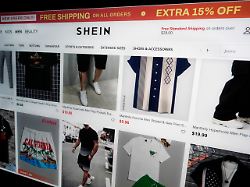Letter to the stock exchange supervisory authority
Cheap fashion retailer Shein is in trouble in the USA
By Diana Dittmer
August 31, 2023, 8:10 p.m
The US Securities and Exchange Commission could put a spanner in the works for the Chinese online giant: Shein wants to go public in the US. 16 attorneys general are calling for it to be ensured beforehand that no clothing made from forced labor is sold.
Possibly illegal production conditions at the cheap fashion chain Shein are calling the judiciary in the USA to the scene. Shein According to insiders, wants to go public this year. 16 attorneys general are therefore calling on the US Securities and Exchange Commission (SEC) to examine the fast fashion provider more closely.
Before the company is allowed to go public in the US, it must be ensured that Shein complies with US law, according to a joint letter from the prosecutors quoted by the US television broadcaster CNBC: It is obvious that Shein is trying to go ahead launch an IPO at the end of this calendar year. Such a move by a Chinese company, which raises concerns about its business practices, requires a process that ensures US laws are complied with. The import of products that are wholly or partly made by forced labor is prohibited by law.
The more than 60 billion US dollar fashion chain Shein stands for fast fashion like no other company. The underlying concept is simple: fashion should be super cheap and reach the customer quickly, faster than any other supplier. The concept has been well received not only by young people in China, but also in the West. Because it benefits to a large extent from the favorable production conditions in China, the company scores above all with the prices. The business model is controversial because it is suspected to be largely based on exploitation.
Politicians put the pressure on
There have been unanswered questions about Shein’s production facilities for a long time. In February, three US senators wrote to the fast fashion company’s CEO, Chris Xu, for a statement on the allegations of human rights abuses.
The letter was prompted by independent laboratory tests that confirmed late last year that garments ordered from Shein contained Xinjiang cotton. According to federal law, products from the region of China may not be imported into the USA because forced laborers from the Muslim Uyghur minority are allegedly used in the manufacture of the goods.
According to reports from former prisoners and human rights organizations, the Chinese government has in the past housed more than a million people in detention camps and forced workers to work in fields and factories. Beijing has always denied these reports.
Shein himself has long remained silent on allegations that he supports forced labor. Previous official statements from the fast fashion retailer only said that Shein is taking steps in all of its markets “to ensure we comply with local laws and regulations.” According to the US website, the company conducts regular reviews to ensure a zero-tolerance policy toward “forced labor” and other environmental and social issues.
A loophole in US legislation
It is true, however, that cotton clothing from the disputed region in China ends up in western wardrobes without being checked. The reason is a loophole in US legislation. Shipments to Shein customers are typically below the $800 US Customs and Border Protection reportable threshold. Online retailer Shein is not subject to any scrutiny where retailers have to make an effort to provide accurate information on the origin of their bulk imports. “Chinese companies like Shein have used this loophole,” Kim Glas, head of the US National Council of Textile Organizations, told Bloomberg.
Public pressure may already be having an impact. Shein has now admitted to the television station CNBC that part of his cotton supply actually comes from Xinjiang. To trace the origins of the fibers in its clothing, the company hired supply chain specialist Oritain. It is said that 2,111 tests were conducted between June 2022 and July 2023, with 46 found to be from regions blacklisted for human rights abuses. That means a good two percent of the samples were “positive”.
Oritain tests more than 1000 cotton samples from across the fashion industry every year. As the US news site Politico reported, twelve percent of the samples in a recent round of tests were positive, i.e. from a “prohibited region”. Shein says she wants to reduce positive test results to zero in the future. As head of strategy and corporate affairs Peter Pernot-Day told CNBC, such “positive raw material tests should be removed from production.” In addition, Shein wants to completely stop buying cotton from China.
